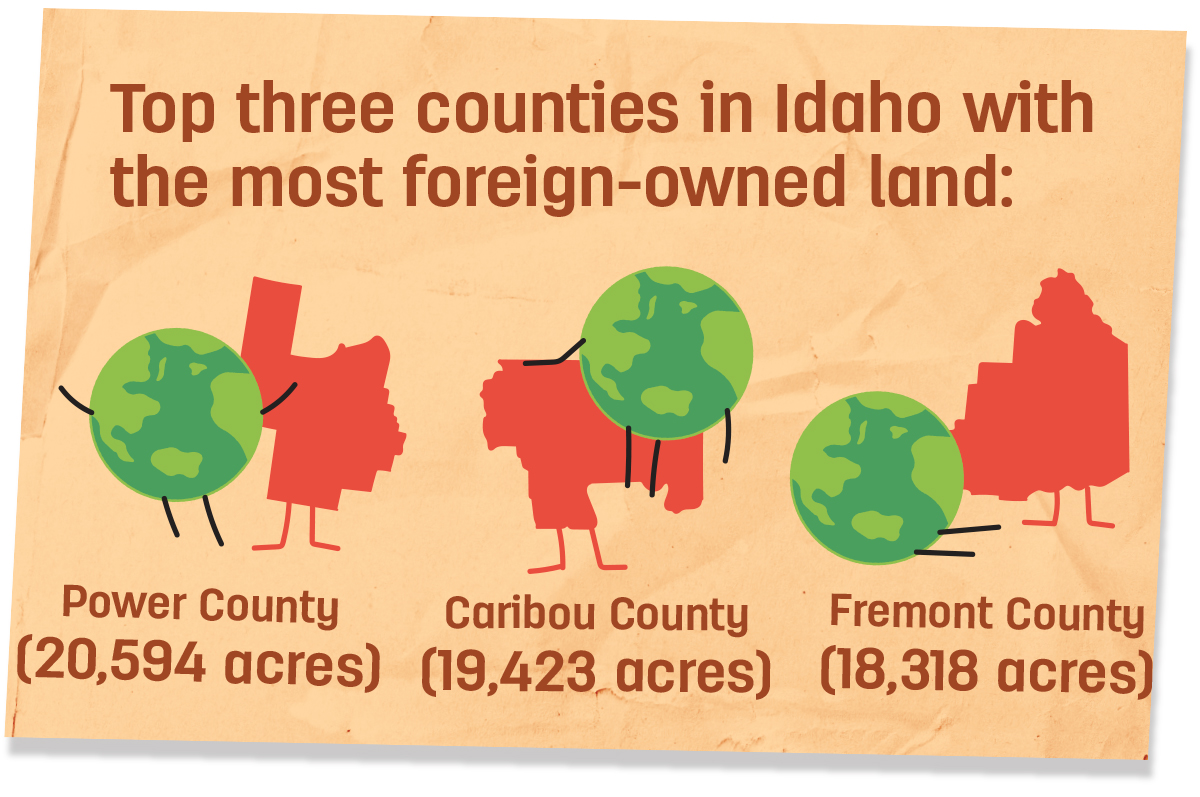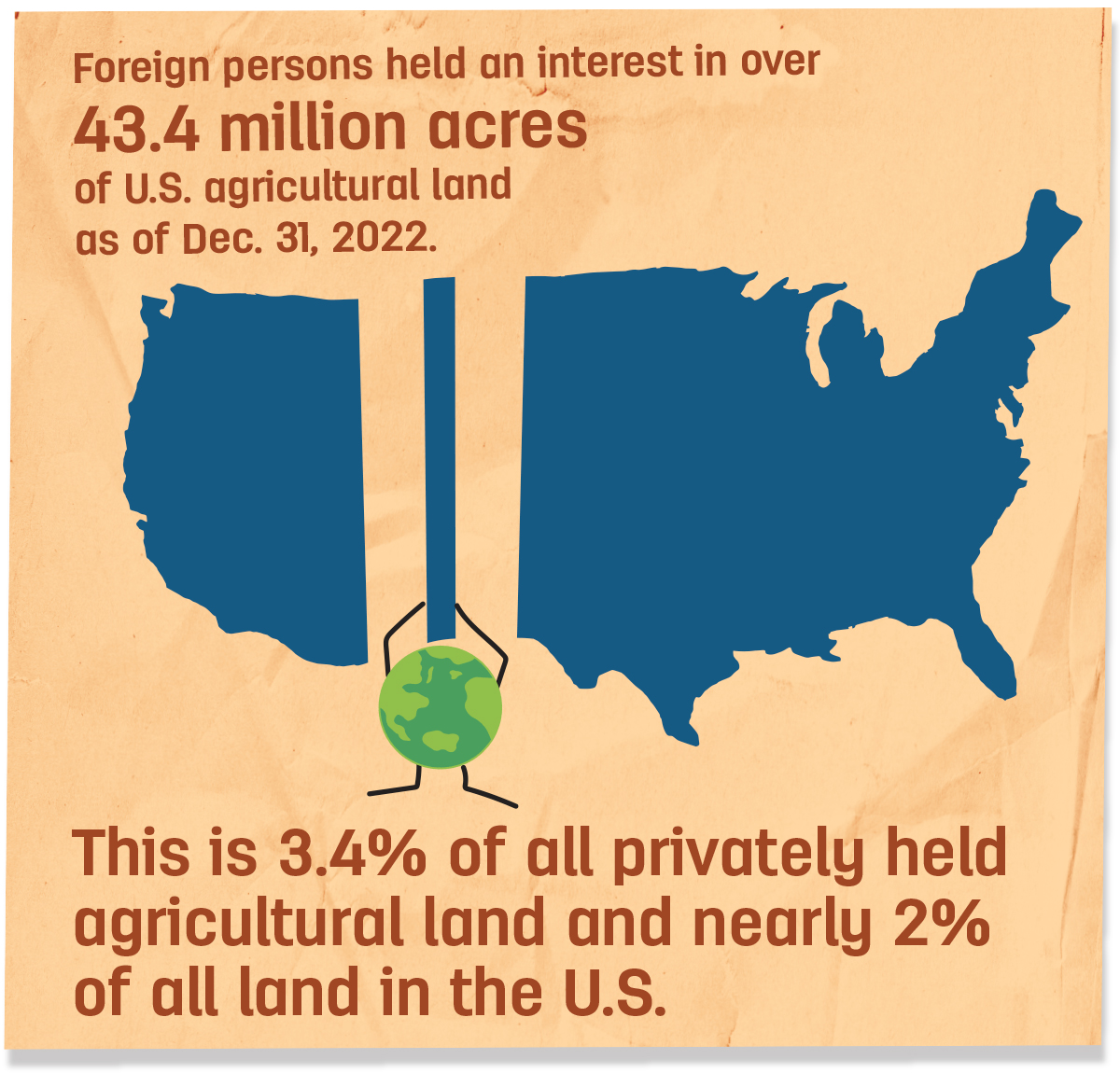When someone asks me about my neighbors around my family’s farm, I tell them about hardworking Joe with his herd of beef cattle, or friendly Mary on the corner with her show horses, or the Jones family down the way with their incredible produce stand and fresh sweet corn. What I don't mention is foreign governments or foreign investors owning agricultural land around my family’s farm. Even though most of us don’t think of these foreign governments or investors as our “neighbors,” they are more prevalent than one might think.
National statistics
According to the USDA's Farm Service Agency, “[f]oreign persons held an interest in over 43.4 million acres of U.S. agricultural land as of December 31, 2022. This is 3.4 percent of all privately held agricultural land and nearly 2 percent of all land in the United States.” Of these 43.4 million acres purchased by foreign investors, the USDA reports that approximately 48.3% consisted of forest/timberland, 28.3% consisted of cropland, 21.3% consisted of pasture and other agricultural land, and the remaining 2.1% included homesteads and roads. However, this USDA data does not account for land use changes that have been made after the land was purchased – accordingly, some of this land has been converted to other uses and is not reflected by that purchase data. Foreign ownership of land in the U.S. continues to steadily increase year by year. The USDA reports that since 2017, foreign ownership has increased by an average of nearly 2.9 million acres per year. The three states with the largest amount of land owned by foreign investors are Texas (5.4 million acres), Maine (3.5 million acres) and Colorado (2.5 million acres).
Federal AFIDA Act
In order to make this data more meaningful, it is helpful to understand how this data is collected and who must report this data. This data is made possible by a federal law known as the Agricultural Foreign Investment Disclosure Act of 1978 (“AFIDA”). This act requires foreign people who acquire or transfer an interest in agricultural land to report said transactions within 90 days of the date of the acquisition or transfer. It also requires foreign people to report land that either becomes or ceases to be agricultural land, and also requires people who own agricultural land to report if they become or cease to be a foreign person. For purposes of the AFIDA, “agricultural land” includes all land used for farming, ranching or timber production if the parcels are more than 10 acres in size in the aggregate. Parcels that are 10 acres or less in the aggregate, but which produce annual gross receipts in excess of $1,000 from the sale of farm, ranch, forestry or timber products, are also subject to reporting.

The AFIDA requires foreign people to report “any interest” in land other than a security interest, with some additional exemptions such as short-term leaseholds, contingent future interests, non-agricultural easements and rights-of-way, interests solely in mineral rights and others. The AFIDA further defines a “foreign person” as any individual who is not a citizen or national of the United States, or its territories; or is not lawfully admitted into the United States for permanent residence. Foreign governments, entities created under the laws of foreign countries, entities with their place of business in a foreign country and U.S. entities that have a substantial foreign interest or are under substantial foreign control are also included in the definition of a foreign person under the AFIDA. (Note that the AFIDA does not prevent ownership of U.S. land by any foreign people, entities or governments – it just mandates the disclosure of the transactions described above.)
Idaho statistics and legislative developments
Moving to Idaho specifically, the USDA reports that there are approximately 122,669 acres of foreign-owned agricultural land, which equates to approximately 0.9% of Idaho’s privately held agricultural land. The top three counties in Idaho with the most land owned by foreign investors include the following: Power County (20,594 acres), Caribou County (19,423 acres) and Fremont County (18,318 acres).
In 2023, the Idaho legislature decided to address foreign ownership of land and passed House Bill 173, which was signed by Gov. Brad Little on April 3, 2023. This legislation was supported by Idaho agricultural interests and commodity groups, who had a hand in crafting the law. This bill goes further than the AFIDA described above and actually prohibits a “foreign government” or a “foreign state-controlled enterprise” from purchasing, acquiring or holding any controlling interest in agricultural land, water rights, mining claims or mineral rights in the state of Idaho. (Note that this does not prohibit an individual citizen from a foreign country from owning land in Idaho – it only prohibits foreign governments or foreign state-controlled enterprises.) However, the bill does include a grandfather clause, which allows any foreign governments or foreign state-controlled enterprises to continue owning land, water rights, mining claims or mineral rights in Idaho if they were owned before House Bill 173 was enacted.
Earlier this year, on March 11, 2024, Little signed House Bill 496, which made some minor but important amendments to the bill passed in 2023. Importantly, House Bill 496 added “forest land” as land that may not be owned by a foreign government or foreign state-controlled enterprise. It also clarified that federally recognized Indian tribes are exempt from the definition of a foreign government and may continue to own land in Idaho.

While Idaho should be applauded for trying to tackle this complex issue that poses a threat to our national security, there is a question of whether Idaho’s actions go far enough and whether this law actually has the teeth it needs to be enforced. For example, the National Agricultural Law Center astutely pointed out that this law is silent on enforcement, while many other states’ foreign ownership laws do contain enforcement provisions. For example, some states authorize their state’s attorney general to bring legal action against foreign parties suspected of violating the law. According to the National Agricultural Law Center, if a foreign party is found to be liable for violating the law, then the laws in other states usually direct judges to order that the land subject to violation be sold through a public auction or judicial foreclosure. Idaho’s law is scant of any similar provision.
Based on the historical USDA statistics, it is likely that foreign ownership of agricultural land in the U.S. will continue to increase and that this topic will remain of interest to both federal and state governments. This is a complex issue that is evolving and many states, including Idaho, will likely continue to amend their laws in the future to tackle this complicated topic.
References omitted but are available upon request by sending an email to the editor.







